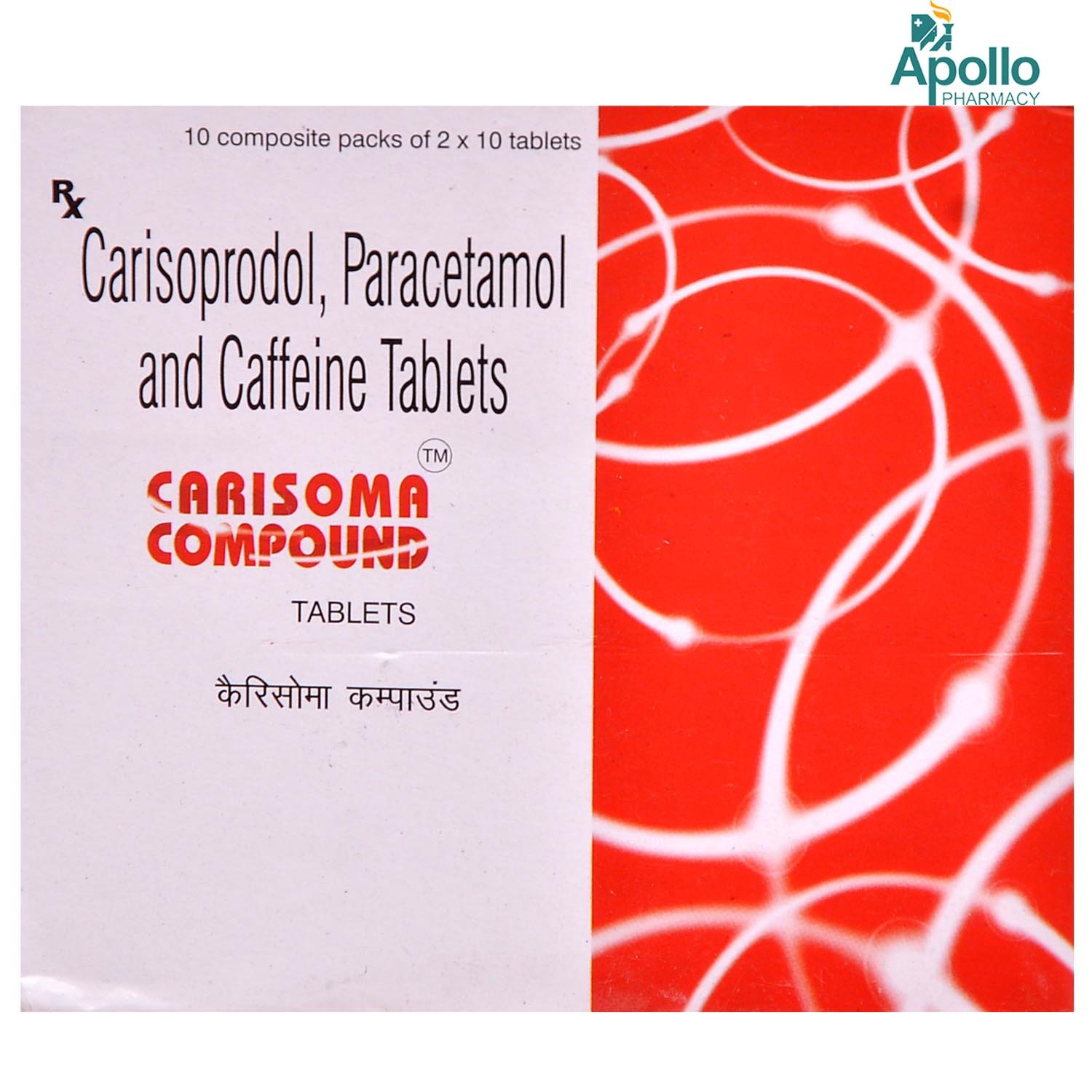Carisoprodol
About Carisoprodol
Carisoprodol belongs to a group of medicines called muscle relaxants indicated as an adjuvant to rest, physical therapy and other measures to relieve acute, painful musculoskeletal conditions.
Carisoprodol contains Carisoprodol, which acts in the brain and nervous system to allow the muscles to relax. This helps relieve muscle stiffness and improves muscle movements, easing pain from muscle spasms.
Use Carisoprodol as recommended by the doctor. Sometimes, Carisoprodol may cause side effects, such as headache, drowsiness or dizziness, fast heart rate, stomach upset and vomiting. Most of these side effects do not require medical attention and will resolve gradually over time. However, you are advised to talk to your doctor if you experience these side effects persistently.
Carisoprodol is addictive in the same manner as sedatives, so it should be used only under the supervision of healthcare professionals. Before taking the Carisoprodol, let your doctor know about all your medical conditions, sensitivities, and medications you are using. Do not use this medication unless prescribed by the doctor if you are pregnant, planning to become pregnant, or breastfeeding. Carisoprodol may cause drowsiness or dizziness; therefore, do not drive or operate any machinery until you are alert. It is recommended not to use children below 12 years. Drinking alcoholic beverages with Carisoprodol is not recommended.
Uses of Carisoprodol
Medicinal Benefits
Carisoprodol is a muscle relaxant, which is a class of medication used to treat acute, painful musculoskeletal problems in addition to rest, physical therapy, and other methods. Carisoprodol contains Carisoprodol, which relaxes muscles by working on the brain and nervous system. This reduces muscle stiffness and enhances muscle mobility, alleviating discomfort caused by muscle spasms.
Directions for Use
Storage
Side Effects of Carisoprodol
- Headache
- Drowsiness or dizziness
- Fast heart rate
- Stomach upset
- Vomiting
Drug Warnings
To rule out the interactions before taking Carisoprodol, inform about all your medical conditions and medications you are taking. There are no adequate and well-controlled studies on pregnant and nursing women, so do not use this medication on your own unless prescribed by a doctor. Your doctor will prescribe only if the benefits outweigh the risks. Carisoprodol is addictive in the same manner as sedatives. Individuals who seek to self-treat muscle pain by taking higher doses than prescribed or utilizing the drug in ways other than intended are more likely to develop an addiction.
Drug Interactions
Drug-Drug Interactions: Carisoprodol may interact with narcotic analgesics (e.g. Fentanyl, morphine, hydrocodone).
Drug-Food Interactions: Avoid the consumption of alcoholic beverages.
Drug-Disease Interactions: Carisoprodol should not be used in patients with acute intermittent porphyria (a rare autosomal dominant illness defined by a hydroxymethylbilane synthase deficiency).
Drug-Drug Interactions Checker List:
Safety Advice

Alcohol
cautionDrinking alcoholic beverages with Carisoprodol is not recommended. Inform your doctor if you consume or have consumed substantial amounts of alcohol before taking Carisoprodol.

Pregnancy
consult your doctorThere are no adequate and well-controlled studies on pregnant women. Your doctor will prescribe Carisoprodol only if the benefits outweigh the risks.

Breast Feeding
cautionThere is no substantial research yet on using Carisoprodol in breastfeeding/nursing mothers. Tell your doctor if you are a nursing mother before taking Carisoprodol; your doctor will decide whether breastfeeding mothers can take Carisoprodol.

Driving
cautionCarisoprodol may cause drowsiness or dizziness. Do not drive or operate machinery unless you are alert after taking Carisoprodol.

Liver
cautionLimited information is available about using Carisoprodol in patients with liver disease. Inform your doctor if you have a pre-existing or a history of liver disease before taking Carisoprodol. Your doctor will prescribe only if the benefits outweigh the risks.

Kidney
cautionLimited information was available about using Carisoprodol in patients with kidney disease. Inform your doctor before receiving the Carisoprodol if you have a history of kidney diseases/conditions. Your doctor will prescribe only if the benefits outweigh the risks.

Children
unsafeCarisoprodol is not recommended for children below 12 years.
Habit Forming
Diet & Lifestyle Advise
- Regular exercise aids in muscle stretching, making them less prone to spasms, tears, and sprains. Mild workouts like jogging and walking can aid with muscle stretching.
- Massages can also be beneficial.
- Avoid freezing and extreme heat.
- Get lots of rest and sleep.
- Change your position at least every two hours to avoid developing pressure sores.
- Muscle spasms can be treated with either hot or cold therapy. For 15-20 minutes, apply an ice pack or a heat pack to the muscle.
- Drink plenty of water to stay hydrated.
Patients Concern
Disease/Condition Glossary
Pain: Pain is a symptom caused by the nervous system that causes unpleasant sensations in the body. Muscle spasms are involuntary muscle contractions that can be painful and uncomfortable. Muscle spasms can occur when the nerve impulses that control muscle movement are damaged or interrupted. Muscle tightness, joint stiffness, unusual posture, difficulty moving, and pain in affected muscles and joints are all symptoms. Muscle spasms can be triggered by fatigue (weakness), stress, extreme heat or cold, infection, and tight clothing.
FAQs
Carisoprodol contains Carisoprodol, which acts in the brain and nervous system to allow the muscles to relax. This helps relieve muscle stiffness and improves muscle movements, relieving pain from muscle spasms.
Many persons who are addicted to carisoprodol are physiologically dependent on it. Physical dependence arises when the body acclimates to a substance and requires the drug to operate normally.
Carisoprodol is a prescribed medication that is highly recommended not to use on your own unless prescribed by the doctor.
Carisoprodol should not be used at a higher dose or longer than the doctor recommends. Inform your doctor if your symptoms are not relieved or subsided.
Many people who are addicted to carisoprodol become physically dependent on it. Physical dependence arises when the body becomes adapted to a drug and then requires it to function normally. When a person develops physical dependence, he or she will experience withdrawal symptoms anytime they reduce or stop using the substance.


